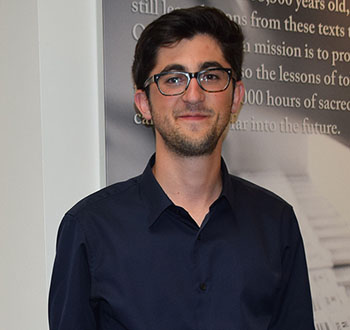
Zach Albert
Zach Albert’s journey to USC Shoah Foundation to work as an indexer on the Jewish Family and Children’s Services (JFCS) of San Francisco Holocaust testimony collection began when he was 12 years old and preparing for his bar mitzvah.
Albert was volunteering at the Dallas Holocaust Museum and had become totally captivated by the survivors he met there – they were like his surrogate grandparents, he said. When it came time for him to decide on a community service project for his bar mitzvah, he noticed that the museum was lacking something important: a Torah scroll.
So, he raised the funds to acquire a scroll housed at Westminster Synagogue in London that had originated in Czechoslovakia and was saved during the Holocaust, and had it sent out to Dallas. He also read from the scroll during his bar mitzvah ceremony.
Years later, while on a trip to Europe during his pre-med studies in college, Albert had the opportunity to see the town where the scroll came from in Czech Republic. Seeing the authentic location as well as the Jewish cemetery gave Albert an epiphany. He decided to drop his medical studies and focus on the Holocaust, which had always been his true passion.
“It was this realization that there’s a lot of pain and suffering in the world but a medical doctor can’t necessarily solve it all,” Albert said. “I’d like to use my history and passion for that history to make a difference that way.”
Albert received his master’s in Near Eastern and Judaic Studies from Brandeis University and then spent several years in the education department at the Los Angeles Museum of the Holocaust. Since January 2014, he has been working full-time from home in Boston to index the JFCS collection for USC Shoah Foundation.
While the testimonies in the collection include such “celebrities” as the son of Portugese diplomat Aristides de Souza Mendes and the wife of Japanese diplomat Chiune Sugihara, who each saved thousands of Jewish refugees, Albert said his favorites to index were the everyday people who are representative of the collection as a whole. Many of the testimonies he indexed were survivors who had spent time in Hongkew, the ghetto for Jews in Shanghai, and immigrated to the San Francisco Bay Area after the war.
“I came to [indexing] with a lot of this history already but it’s work and it’s education at the same time which is amazing,” Albert said. “I feel like after every story I learn more and get to delve a little bit deeper.”
What he values most about the JFCS collection is its focus on the individual. It can feel overwhelming, even paralyzing, to try and think about the six million victims of the Holocaust, but the testimonies allow people to get to know victims and survivors as real people.
It’s easy for other people to dismiss indexing as a morbid and depressing job, but Albert doesn’t see it that way. Through his work, he is helping prepare for a very near future when no one will be able to meet Holocaust survivors in person anymore.
“To listen to these testimonies and hear their reflections and their hope for the future for their children, their children’s children, and humanity in general – as an indexer, to be able to play a small role in helping to preserve and then make accessible their stories for researchers and students in perpetuity, it’s humbling and it’s a blessing,” Albert said.
Albert cited the old adage that every person experiences two deaths: when they take their last breath, and when their name is spoken for the last time.
“I feel like this collection allows that second death never to happen,” he said.